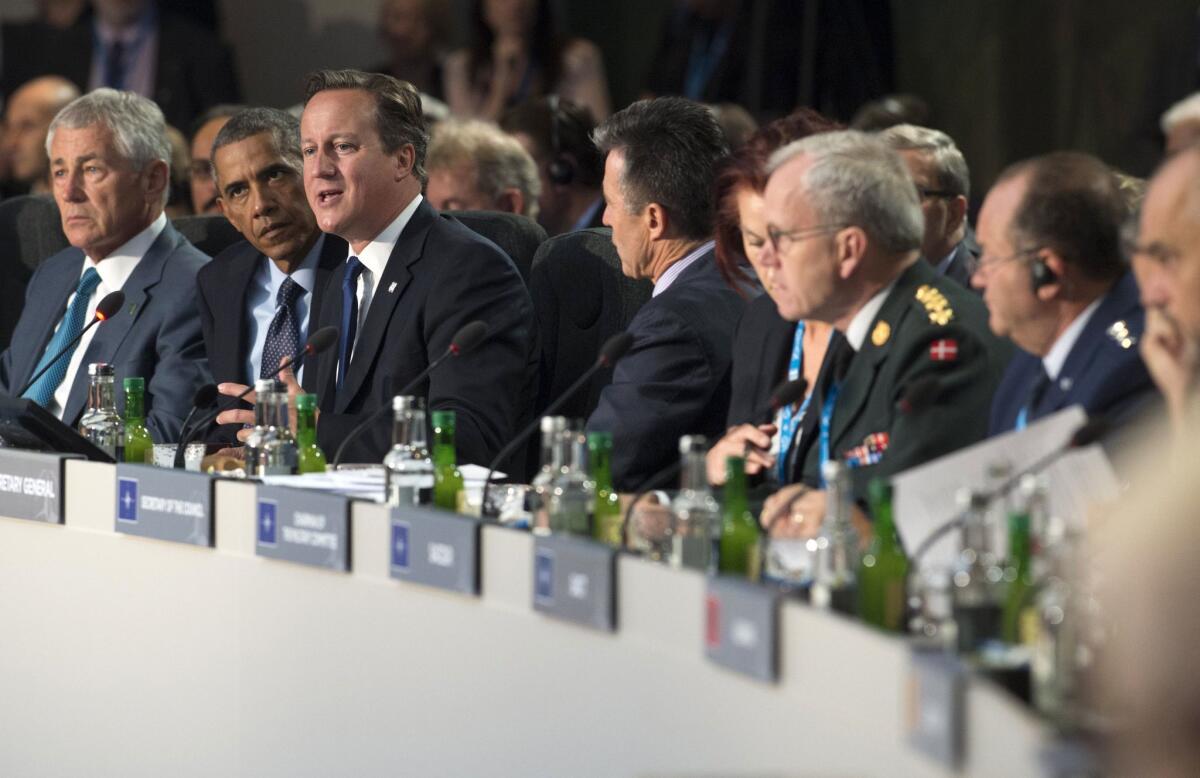Obama offers cautious optimism on announced cease-fire in Ukraine

- Share via
Reporting from Cardiff, Wales — President Obama offered cautious optimism Friday about a newly announced cease-fire between Ukraine and Russia and suggested that European leaders should proceed with plans to impose new sanctions against Russia until they’ve tested that the agreement holds.
“We are hopeful but based on past experience also skeptical,” Obama told reporters at a news conference as the NATO summit wrapped up. ”It has to be tested.”
NATO Secretary-General Anders Fogh Rasmussen echoed Obama’s wariness about the cease-fire announcement.
“We know that one thing is a declaration, another thing is implementation,” he said. “Nevertheless, I would welcome, of course, if the new announcement of the cease-fire represents a sincere attempt to stop the violence and initiation of a constructive political process.”
Obama noted that European leaders were finalizing details of a new package of economic penalties aimed punishing Moscow for its involvement in the separatist conflict in eastern Ukraine. Obama said he believes the sanctions are working to shift Russian President Vladmir Putin’s strategy and that it was too soon to ease up on them.
“The only reason that we’re seeing this cease-fire at this moment is because of the sanctions already applied and the threat of further sanctions,” Obama said.
Still, he suggested that if Russia de-escalates the conflict, the West could roll back sanctions.
White House officials say the new round of economic penalties, which have been in the pipeline since last week, could be announced in the coming days. Meanwhile, NATO leaders pledged new support for the Ukrainian military before concluding the two-day summit.
“Russia must continue to face costs for its own escalation,” deputy national security advisor Ben Rhodes said. “If Russia escalates, we stand prepared to escalate our pressure.”
The expected sanctions are a response to what Ukraine’s leaders have called a Russian invasion of eastern Ukraine, although Obama has not used that word. The conflict consumed much of the discussion at the biennial summit, overshadowing the long-planned talks on winding down the NATO presence in Afghanistan.
In addition to the new measures, NATO leaders also began to reveal the details of a new Readiness Action Plan, which they say will increase NATO’s visibility in Eastern and Central Europe, as well as improve the alliance’s ability to react quickly to conflicts -- like the one in Ukraine. British Prime Minster David Cameron, the summit host, said Friday that Britain would contribute 3,500 personnel.
“We must increase our capacity,” he said.
The show of support for Ukraine was finalized Thursday, officials said, in a small group meeting of Obama, European leaders and Ukraine’s President Petro Poroshenko, as well as a wider conference.
NATO leaders there agreed on a strategy for funneling security aid, such as weapons and body armor, as well as humanitarian assistance to Poroshenko’s young, besieged government. Most of the aid will continue to come from individual member nations, but NATO will act as a clearinghouse, said Doug Lute, the U.S. ambassador to NATO.
Ukraine is not a NATO member but has partnered with the alliance in various missions, Lute noted. NATO will use that partnership “to continue to build the capacity of Ukrainian forces not for the purposes of working together in Afghanistan and Kosovo now, but actually for the purpose -- the fundamental purpose of defending their own country,” he said.
“In these turbulent times, NATO must be prepared to undertake the full range of missions and to defend allies against the full range of threats,” Fogh Rasmussen said after the plan was approved.
The NATO assistance is to be paired with new sanctions likely to be announced by the European Union and the United States. Previous penalties have hit the so-called Russian cronies who wield influence over Putin, as well as the country’s financial institutions, energy development enterprises and arms industry.
White House officials suggested that the next steps would take a bigger bite at those sectors.
For more news on President Obama’s trip, follow @Khennessey
More to Read
Sign up for Essential California
The most important California stories and recommendations in your inbox every morning.
You may occasionally receive promotional content from the Los Angeles Times.














